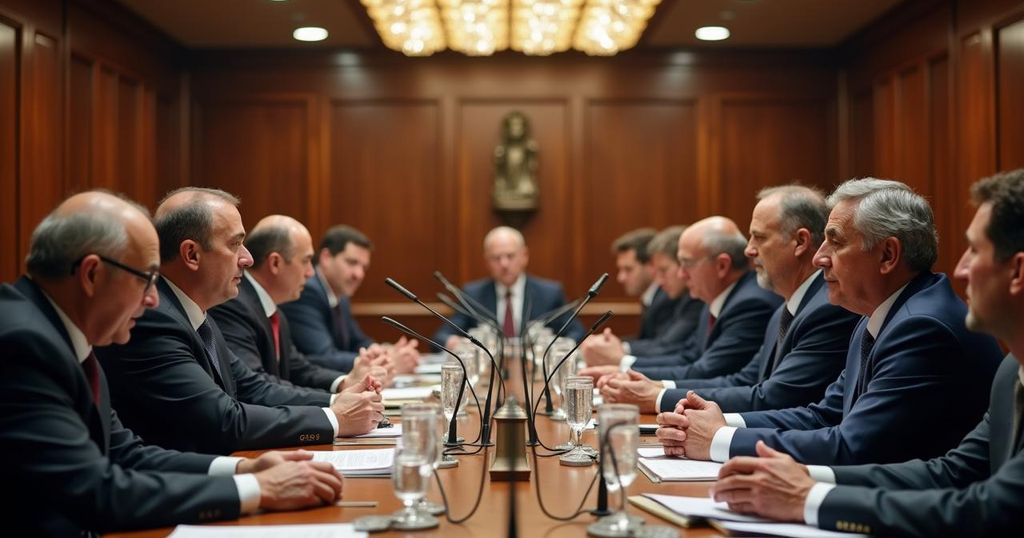U.S. Seeks New Opportunities to Resolve Lebanon’s Political Stalemate

The United States is exploring new diplomatic efforts to resolve Lebanon’s political deadlock, heightened by recent Israeli military actions that have weakened Hezbollah. Secretary of State Antony Blinken is engaging with Saudi, Qatari, and French officials to facilitate the election of a new president, which may help stabilize Lebanon and ease tensions with Israel, while emphasizing Lebanese sovereignty in decision-making processes.
The United States is recognizing a potential opportunity to address the prolonged political stalemate in Lebanon, particularly in light of recent military actions by Israel that have significantly diminished Hezbollah’s leadership. U.S. Secretary of State Antony Blinken has engaged in discussions with key foreign counterparts from Saudi Arabia, Qatar, and France, exploring possibilities for the election of a new Lebanese president as a means to alleviate tensions between Israel and Hezbollah, and thus mitigate ongoing conflict in the region. During a press briefing in Laos, Secretary Blinken expressed, “It is clear that the people of Lebanon have an interest, a strong interest, in the state asserting itself and taking responsibility for the country and its future. The presidency has been vacant for two years now, and for the Lebanese people, having a head of state would be very important.” For the past two years, Lebanon’s governmental gridlock has resulted in a vacuum at the presidential office following former President Michel Aoun’s departure in October 2022. Despite attempts by a deeply divided parliament to elect a successor, these efforts have repeatedly failed, often due to Hezbollah’s backing of Sleiman Frangieh, a candidate perceived as closely aligned with the group. Meanwhile, other factions have proposed various candidates, with General Joseph Aoun, the Lebanese Army Commander, being considered as a primary contender, although he has yet to formally declare his candidacy. The economic challenges faced by Lebanon are dire, with around seventy-five percent of the population reported to be living in poverty as a result of ongoing political paralysis and stagnation in necessary economic reforms. U.S. officials suggest that the recent weakening of Hezbollah’s military capabilities may offer a unique opening for diplomatic progress in Lebanon, despite skepticism regarding Hezbollah’s entrenched presence in the country’s political and social fabric. Mr. Blinken intends to further these discussions, including attending an international conference on Lebanon hosted by France, signaling a commitment not only from the U.S. government but also from other nations concerned about Lebanon’s stability. He has noted a strong interest among Lebanese citizens and regional allies in reinstating effective governance and emphasizing Lebanese sovereignty in the electoral process. Additionally, Blinken has emphasized the need for full implementation of U.N. Security Council Resolution 1701, advocating for the return of civilians on both sides of the Israel-Lebanon border and restoring stability in that region. Ed Gabriel, president of the American Task Force on Lebanon, also commented on the essential nature of the electoral process in Lebanon, expressing, “There is an opportunity right now for Lebanon’s parliamentarians to convene and elect a clean, competent, and reform-oriented president who can form a government that can steer Lebanon through what is a dangerous but critical phase.”
The political landscape in Lebanon is marked by a complex sectarian power-sharing system that often leads to substantial gridlock, particularly evident over the last two years due to the presidential vacancy following Michel Aoun’s departure. This deadlock has precipitated a severe economic downturn, with a significant portion of the population plunging into poverty. Given recent developments, including military actions impacting Hezbollah, there is renewed interest from the U.S. and other nations to facilitate resolution and facilitate political progress within Lebanon’s parliament. The ongoing situation continues to pose concerns not only for Lebanon’s domestic stability but also for regional peace, particularly in relation to neighboring Israel.
In summary, the United States, under the leadership of Secretary Antony Blinken, is advocating for renewed efforts to address Lebanon’s political deadlock and to encourage the election of a new president as a means to stabilize the region. Recent military actions against Hezbollah by Israel may have opened a crucial window for diplomatic engagement, leading to potential shifts in the political landscape of Lebanon. Nonetheless, the path forward remains fraught with challenges, necessitating concerted efforts from both local leaders and international stakeholders.
Original Source: apnews.com








